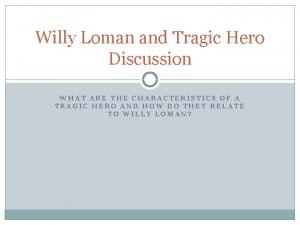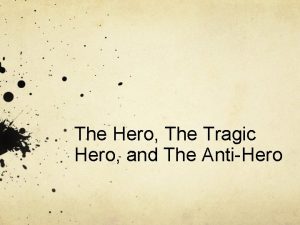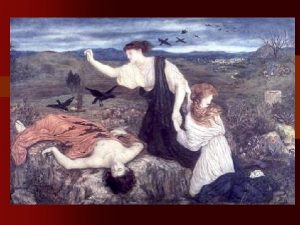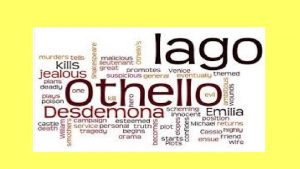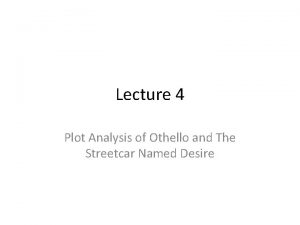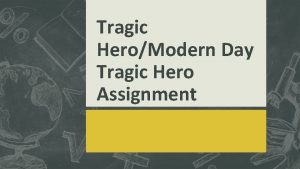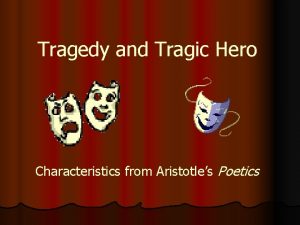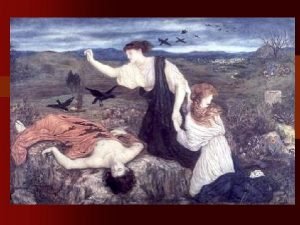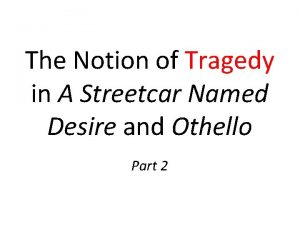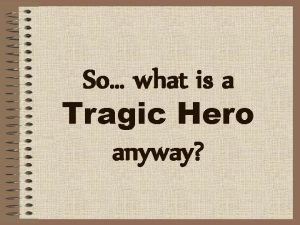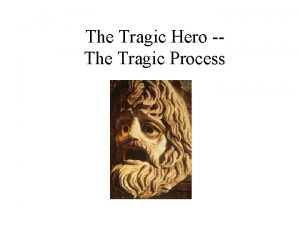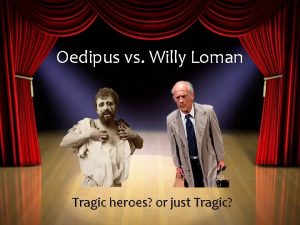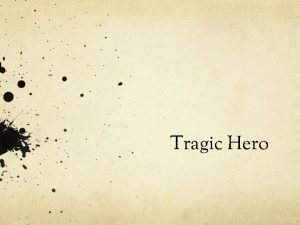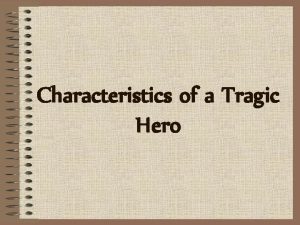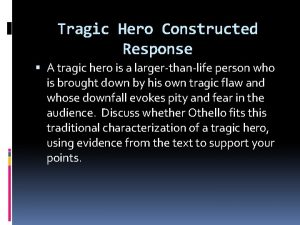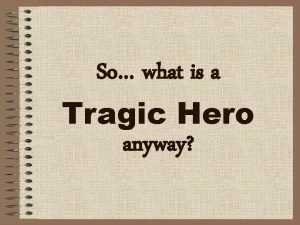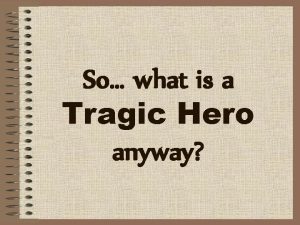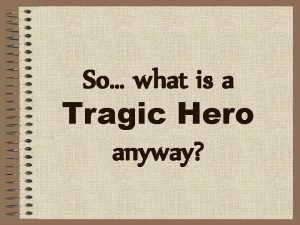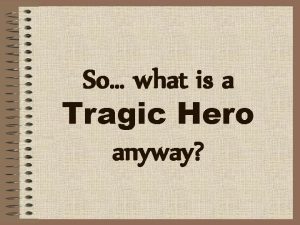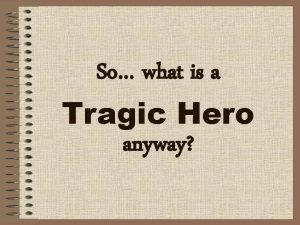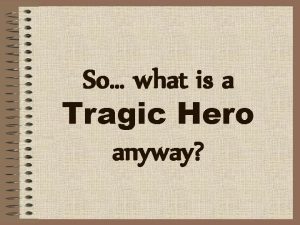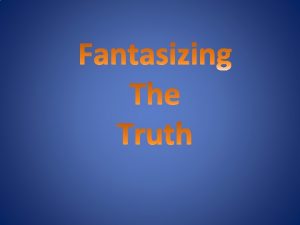Willy Loman and Tragic Hero Discussion WHAT ARE





















- Slides: 21

Willy Loman and Tragic Hero Discussion WHAT ARE THE CHARACTERISTICS OF A TRAGIC HERO AND HOW DO THEY RELATE TO WILLY LOMAN?

Five Elements of Tragic Hero 1. Usually of noble birth 2. Hamartia – tragic flaw that brings about the ultimate downfall 3. Peripeteia – reversal of fortune brought about by the tragic hero’s flaw 4. Actions result in an increase of selfawareness and self-knowledge - anagnorisis 5. Audience must feel pity and fear for this character - catharsis

Other Common Traits * Downfall due to excessive pride (hubris) * Doomed from the start – downfall due to their own actions * Usually a king or leader of men * Suffering of the hero must have meaning * Almost always male (exception -Cleopatra from Antony and Cleopatra ) (this would not necessarily be true of “modern” plays) Modern Tragic Heroes: Willy Loman – Death of a Salesman Perry Smith – In Cold Blood

Nobleness (nobility) of birth �Nobility of birth �Wisdom by virtue of birth

Person often of noble birth �Willy is not of noble birth; he is a common man, a salesman. �However, Miller wrote in his famous essay “Tragedy of the Common Man, ” “I believe that the common man is as apt a subject for tragedy in its highest sense as kings were. ” He says the status as king is not what resonates with modern audiences. It’s the fact that they share the same problems as we do today, the same flaws, hopes and fears.

Loman – common man �Look at his name to start – Loman �Resembles an Everyman character �He is a low man not a great man, he is the/a common man �Miller would ask: Can’t we look into the life of a common man and recognize our own flaws? Can’t we see those flaws in society and people around us? Why can’t a common man’s life have size and meaning? (of course, it can – and can be just as tragic) �He is a low man whose dreams and expectations have been shattered by the false values of the society he put his faith into

Name Symbolism �While Miller also acknowledged that he knew a man by the name of Loman - refer to the Introduction handout. �The name, like Singleman, has obvious symbolic associations. �Single man – solitary, surrounded by buyers and people from business at his work – but died in a train car working at 84 – no mention of family, children �Monetary success and a luxurious lifestyle do not replace the desire and need for love and family, which are also important components of a happy, successful, rich life. �Irony of Willy’s second son Harold’s nickname – Happy �Linda means beautiful. What is Biff’s real name?

Must a tragic hero be great? �Some critics feel that true tragedy is impossible when the hero is a common man. They say that when an everyday guy goes down, not as many people suffer as they would if it were a king. �Miller ends his essay saying, “It is time, I think, that we who are without kings took up this bright thread of our history and followed it to the only place it could possibly lead in our time – the heart and spirit of the average man. ”

Willy - characterization �Willy is blind to the reality around him. He is a dreamer who is unable to face the realities of a modern day society. Willy builds his whole life around the philosophy that if a person is well-liked and good looking, he will be successful. His blindness prevents him from realizing that his dreams and values were flawed. Because of his unwillingness to change, Willy dies at the hands of his own tragic flaw.

Hamartia or Tragic Flaw �Tragic flaw that brings about the character’s ultimate downfall �Often related to hubris – excessive pride �What is Willy’s tragic flaw? Write it an explain.

Willy’s Hamartia �Willy goes through his life blindly, never realizing the full truth of himself. Willy refuses to admit that he will never fulfill his unrealistic goals of success. The idea of his hamartia can be seen in his delusional personality. His hamartia causes his own downfall. In the end, Willy’s delusion lead him to take his own life. �Willy has a misguided notion of the definition of success. He should see that certain jobs fit certain people, and happiness – not money, fame or being well-liked –is a noble goal.

Willy’s Flawed View �Willy searches for the key to success, the “answer” but there is no get rich quick scheme. (We see this common misunderstanding in American television and endeavors today). �There is no substitute for a good education. �There is not substitute for hard work, character, integrity. �People respect people who are humble and genuine. �Words should have meaning; they should be savored not used excessively without regard for truth!

Peripetia or reversal of fortune �A reversal of fortune brought about because of the hero’s tragic error �Willy had set out on a quest to achieve money, fame, and happiness as a traveling salesman. However, Willy's work ends up producing the exact opposite results of those which he had initially set out for himself: his family is in debt, he is "not noticed" (28) by his colleagues, and he is ultimately "exhausted" (8), cranky, and ill. This unfortunate turn of events can be classified as peripeteia. In plot, character faces suffering

Anagnorisis or self-awareness �Actions result in an increase of self-awareness and self-knowledge �Moment when the character realizes the terrible mistake he has made �Recognition or discovery that the reversal of fortune was brought about by the hero’s own error �Recognition from ignorance to awareness of a bond of love or hate (arouses pity and fear) �What is Willy’s realization? When does it occur?

Willy’s realizations �Willy has a realization near the end of the play �He never says it directly, but at some point (perhaps after Howard fires him) he must realize that he’s just never going to succeed in business. If he didn’t come to this realization, then he wouldn’t decide to kill himself so Biff could use the life insurance money. �-He realizes that Biff loves him.

Anagnorisis and Symbolism �Concerning anagnorisis, which refers to "a change from ignorance to knowledge" (Mc. Manus), in the end of the play, Willy realizes that his dream of success has not materialized (this can be seen in the symbolism of the seeds). �What do the seeds and Willy’s attempts to plant them represent? Explain.

Not a full anagnorisis �Though Willy makes some small realization toward the end of the play, you may hesitate to call it a full anagnorisis. Willy goes to his death amidst a cloud of delusion. Even after Biff tries to explain it to Willy, he refuses to understand Biff’s desire to go out West. He realizes that Biff loves him. �The pitiful saleman kills himself, thinking that Biff will use the money to start a business, but it is obvious at the funeral, this will not occur, showing that Willy went to his death without coming to grips with reality. (no major anagnorisis) �He never realizes his own worth. The man meant more to his family than money.

Catharsis – pity or sympathy for character �Catharsis or outpouring of emotion and a purification or purging of those emotions �This purification may take place within the action of the play only or �The audience may feel pity and/or fear for this character and undergo a cathartic experience �(debated topic if catharsis must occur in character or audience or both) �This can be seen in your reaction to him as you read/watch – do you pity him? Do you feel sorry for him? Can you feel the anguish in Linda’s voice when she calls out to him and he has taken the car out?

Aristotle Quote �“ A man cannot be a hero until he sees the root of his own downfall. ” Aristotle �Debatable if Willy is even a hero. (goes back to Miller’s idea of a modern tragic hero – can a common man be a hero – and to whom? ) to his family – he could be or could have been �They idolized him when they were young. Biff does call him “a prince” and realizes his worth at the end and even if he is flawed he did try to create a life for himself and his family. What does it mean to be a hero in today’s world? Are their common men who do heroic but small acts?

SEEDS symbolism �What is the significance of the seeds and Willy’s desire to plant a vegetable garden? Connect it to other characters or ideas in the play.

Works Cited �Mc. Manus, Barbara. Outline of Aristotle's Theory of Tragedy in the POETICS. Nov. 1999. Wed. 30 March. 2010
 Oedipus rex as a tragic hero assignment
Oedipus rex as a tragic hero assignment Biff loman
Biff loman Insidan region jh
Insidan region jh Anti-hero traits
Anti-hero traits A character whose personality and attitude contrast sharply
A character whose personality and attitude contrast sharply Tragic hero features
Tragic hero features Tragic hero othello
Tragic hero othello Shakespearean tragic hero characteristics
Shakespearean tragic hero characteristics Othello soliloquy act 1 scene 3
Othello soliloquy act 1 scene 3 Tragic hero definition
Tragic hero definition Macbeth tragic hero
Macbeth tragic hero Is othello a tragic hero
Is othello a tragic hero Dr faustus as a tragic hero
Dr faustus as a tragic hero Tragic hero cycle
Tragic hero cycle Modern day tragic heroes examples
Modern day tragic heroes examples Tragic hero definition aristotle
Tragic hero definition aristotle Barabas as a tragic hero
Barabas as a tragic hero Tragic hero structure
Tragic hero structure Characteristics of tragic hero according to aristotle
Characteristics of tragic hero according to aristotle Characteristics of a tragedy
Characteristics of a tragedy Tragedy in a streetcar named desire
Tragedy in a streetcar named desire Tragic hero cycle
Tragic hero cycle
